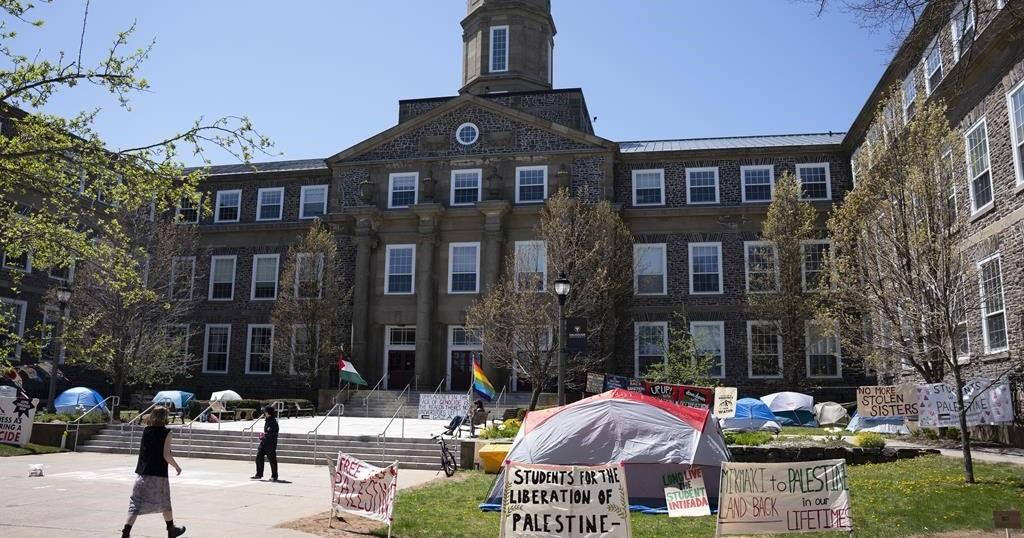HALIFAX – Pro-Palestinian demonstrators briefly occupied a building at Halifax’s Dalhousie University on Monday, as their encampment that had been on the school’s downtown campus since May was dismantled by staff and security.
By Monday afternoon, the encampment that had been on the Studley Quad since May was no more, just as similar protest camps have been removed in recent weeks on campuses across the country.
Protesters at Dalhousie included the Students for the Liberation of Palestine, which describes itself as a coalition from Dalhousie and four other Halifax schools — Saint Mary’s University, University of King’s College, Mount Saint Vincent University and the Nova Scotia College of Art and Design University. They had refused to leave until all universities in Halifax disclose their investments in companies tied to Israel, divest from them, and reinvest that money in scholarships for Palestinian students.
But on Friday Dalhousie issued a statement saying encampment participants had to remove all objects and personal belongings from the site by Sunday at 7 p.m.
And by Monday morning at around 6:30 a.m., security guards started removing tents, banners and large signs at the encampment. It was around the same time that Students for the Liberation of Palestine were told by email that a meeting scheduled later that morning with Dalhousie’s vice-provost of student affairs was cancelled, said Owen Skeen, president of the NSCAD student union and an encampment spokesperson.
“People are feeling really frustrated, really disappointed,” Skeen said Monday afternoon.
“But this is definitely not the end, and there’s a lot more to come,” he added.
Skeen was told by police that he has been banned from Dalhousie campus for six months. The NSCAD student says he hopes to appeal the ban.
“This tells us that the school wants to ensure students cannot organize or work together across campuses,” he said.
By 2:30 p.m. many demonstrators left the area they had been occupying for the past 78 days, Skeen said, and moved a number of tents, signs and a massive Palestine flag to the main floor of the nearby Kenneth C. Rowe management building.
That’s when Dalhousie staff and security removed the remaining tents and signs on the quad and cordoned the area off with yellow tape.
By 3:15 p.m., about 25 demonstrators and 12 tents filled the main floor of the management building, as protesters with megaphones chanted, “free, free Palestine.” School security asked protesters to leave, and by about 4 p.m. nine Halifax Regional Police officers arrived and escorted the group out onto a grassy berm across the street.
A Dalhousie spokesperson declined to comment on the encampment removal, and Halifax Regional Police did not immediately say if anyone was arrested or fined.
Shira Lurie, an assistant professor at Saint Mary’s University and a member of Nova Scotia’s Jewish Faculty Network, said the schools should meet the group’s demands, “which are incredibly reasonable and logical: disclosure, divestment and reinvestment.”
“Instead of meeting the students’ demands, commending students for this activism and their commitment to human rights, the university has instead served them an eviction notice,” Lurie said in an interview Monday.
Ajay Parasram, an associate professor of international development studies and history at Dalhousie, has been a supporter of the student encampment since it began, and says he’s disappointed with the university’s actions.
“I got the call early this morning that people were here taking down tents, so I rushed over,” he said in an interview Monday.
“It seemed until last week that our university had decided to chart an alternative course and not go the way of McGill, York and others,” he said, referring to universities that have ordered the dismantling of pro-Palestinian protest encampments on their campuses.
“Then seemingly out of nowhere, they did a complete 180 with no consultation,” he said of Dalhousie’s notice to vacate.
“I think the actions of the school are very dishonest, and I find it deeply disappointing as a faculty member,” Parasram said.
This report by The Canadian Press was first published July 29, 2024.

























